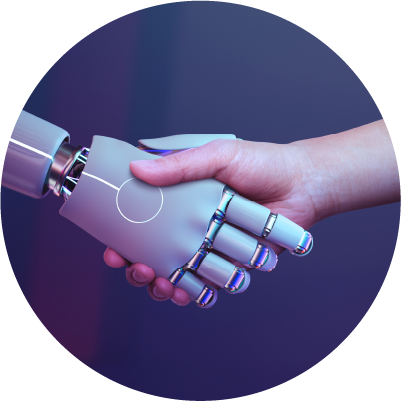Artificial intelligence (AI) is changing the world as we know it today. It can write us an article, create an impressive piece of art and music or help us to defeat the champion in the most creative board game. And though it can sound scary, AI gets to know us better than anyone else: perfectly knowing our preferences and suggesting our favorite movies, articles, books, or songs.
AI technologies could already make revolutions in e-learning as well. It can help to adapt personalized education programs according to the needs or to determine the learning level and the gaps that require improvement. But can these technologies fully replace a human specialist in creating e-learning courses?

Creative or bland content?
AI-generated content is a great way to create content quickly without spending much time researching. It only takes time to put some keywords, phrases, or topics, and you get any content you need. Sounds like an easy way easily creates as much content as you need. But there are unwanted risks in using AI for content generation.- If we want to get content for creating an e-learning course, there is a huge risk of factual errors. So even if you create content using an AI generator, fact-checking should be part of your content workflow.
- The content the AI generator creates is not original. These programs are only reformatting information they find on the internet. So, it means you will not be making groundbreaking content with original ideas or fresh insights based on your organization’s identity.
- The content the AI generator creates can be messy. The problem is that AI cannot craft a fully-developed, well-thought-out, structured storyline. So, if you prepare content for your e-learning course using an AI generator, be aware that users will have difficulties understanding it.
AI image generator only for entertainment?
If you have been using social media lately, you had to notice a new trend of photos being transformed into artwork. The AI image generator takes your photo and creates a magic avatar of your face. Well, that could be a really attractive way to improve your social media content. There are also AI image generators created from the connection of two separate technologies. One was a historical line of deep learning neural nets that could generate coherent realistic images, and the other was a natural language model that could serve as an interface to the image engine. So, now, AI image generators can convert your text to an image.If you are creating an e-learning course, visual design is a crucial aspect as it keeps the learner engaged in the content. AI image generator can be a good tool if you lack ideas on creating a conceptual design for your content. But it cannot be the main tool for creating an e-learning course as it comes with some risks.
AI image generator comes up with the same problems as creating content. AI might not understand your text, meaning images can be misleading. In an e-learning course, visualization must go with the content you present, or it can be misunderstood. And with originality, if you create your content on your own, you will probably not want to put images created by someone else. AI generators cannot create new ideas; they will use existing data to create them. But this is not the only risk.
The main problem with AI image generators these days is that all these models are also trained on copyright-protected data. So this means that the AI generator meshes together other artists’ styles, techniques, or themes and creates the art piece. And this raises not only ethical concerns but also the uniqueness of your content.
Adaptive learning is the future
Adaptive learning is an educational method that uses AI technologies to deliver custom learning experiences based on the learners’ unique needs. There are many adaptivity factors that AI analyzes to personalize courseware appropriately. These factors could be about learners’ performance in all e-learning courses and based on custom behaviors, such as how much time the user takes to complete the task. And this becomes the benefit of AI as adaptive learning is the future of education. Learning Management System (LMS) platforms are AI-powered platforms where artificial intelligence is becoming more aware of what the user thinks and does and can analyze what content the user prefers and consumes. AI technologies integrated into LMS brought a new idea of learning: if we want to have the effect of learning, we should put learners at the center and adapt the learning content to their unique needs. So, what are the improvements of LMS using AI technologies?- AI personalizes the learning for each user based on their learning style and pace.
- AI can provide employees with real-time assistance. So, whenever the user has doubts about learning content, he can get answers immediately. It also can save the user time as he does not need to google information whenever he gets confused.
- AI improves content accessibility for people with disabilities. So learning can be adapted even for blind people because AI can read texts or recognize signs.
Conclusions
AI is the new reality in our modern society as technologies help improve many human tasks. So, it should not be concerned as the evil which will fully replace humans in the workforce. In the e-learning industry, AI technologies can be used as a great tool to improve technical challenges as you can spend more time creating and bringing the best learning experience.
